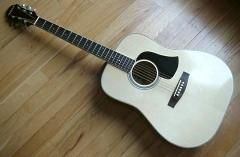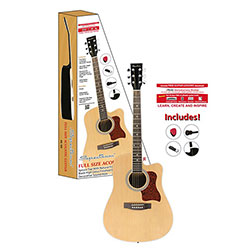
acoustic guitar songs for beginners kids image

can't stop
I'm so confused. I have no idea what's the difference and what is better. I want to play Jonas Brothers songs or Paramore songs - somewhere between that line. I'm new in this whole pick-out-a-guitar thing because I'm getting my first one very soon. Any help here? Thanks so much.
Answer
First I'll say that in my opinion you would be best off to start with a steel string acoustic guitar for the songs you wish to start playing. The difference between them is that:
Classical Guitar, well the strings are nylon, so it's not optimal for strumming but great for finger picking. The neck is wider so again great for finger picking... in a way... moving on the body is constructed differently and it is smaller than an Acoustic Dreadnought steel string guitar would be, but there are smaller bodied guitars for younger people or for comfort/personal preference.
Now going to the Steel String Acoustic guitars, personally I love them, but most songs that you would hear on the radio are steel string guitars, electric or acoustic. The neck is thinner and it makes it nice if you have smaller hands/fingers. Most steel string guitars are dreadnought body types... and they tend to be a little bulky if your small/young or petite, but not unplayable. There are kids that are about 5 years old playing guitars bigger than themselves. anyway there are thinner bodied acoustic that might be more coftorble. Go with whatever you like and feel comfortable with.
Ibanez, Epiphone, and Yamaha are some great beginner acoustic guitars that don't cost too much but have quality.
**Most important is go with what you want and what feels comfortable. And if something catches your eye, try it out.**
Well that's my advice, hope it helps you (>^_^<)
First I'll say that in my opinion you would be best off to start with a steel string acoustic guitar for the songs you wish to start playing. The difference between them is that:
Classical Guitar, well the strings are nylon, so it's not optimal for strumming but great for finger picking. The neck is wider so again great for finger picking... in a way... moving on the body is constructed differently and it is smaller than an Acoustic Dreadnought steel string guitar would be, but there are smaller bodied guitars for younger people or for comfort/personal preference.
Now going to the Steel String Acoustic guitars, personally I love them, but most songs that you would hear on the radio are steel string guitars, electric or acoustic. The neck is thinner and it makes it nice if you have smaller hands/fingers. Most steel string guitars are dreadnought body types... and they tend to be a little bulky if your small/young or petite, but not unplayable. There are kids that are about 5 years old playing guitars bigger than themselves. anyway there are thinner bodied acoustic that might be more coftorble. Go with whatever you like and feel comfortable with.
Ibanez, Epiphone, and Yamaha are some great beginner acoustic guitars that don't cost too much but have quality.
**Most important is go with what you want and what feels comfortable. And if something catches your eye, try it out.**
Well that's my advice, hope it helps you (>^_^<)
Why do so many people believe there is only one correct way to learn or play guitar?

cnewshadow
This is mostly for the veteran guitar players who answer questions here.
Why do so many of you seem convinced that any way to learn guitar other than how you did is wrong?
I see many answers that say you MUST learn on an acoustic first. Or that you MUST get lessons from an instructor. Or that you MUST learn how to read music.
I learned on an electric. I took lessons for about 6 months and have been self-taught for the last 17 years. I can somewhat read music, but I didn't learn as part of my guitar training.
I didn't learn the way I'm told people are "supposed" to learn, and I think I've proven through my answers here that I am least a competent guitarist and know what I'm talking about, if not a master or virtuoso (I make no claim to being either).
So, why is there this mindset that there is only one "right" way to do it? I chose the guitar as my instrument for the sheer versatility of it. Only a synthesizer is capable of producing a wider variety of sounds. As such, I see no reason to artificially limit what you can do with it by sticking to a rigid structure of learning and playing.
Some of the greatest guitar music ever recorded was played by people who couldn't read music and taught themselves how to play by ear. I like to try and encourage people to discover things on their own, because I've found that some of the most innovative music is written and played be people who don't know they aren't "supposed" to play it like that.
I'm not trying to be insulting or imply that there is anything wrong with learning the way you did, because that would be a little hypocritical given the question I'm asking. I'm just wondering what leads to the mindset that only one way is acceptable.
@Tony B
Thanks for the well thought out answer.
I think a "good" teacher is someone who will teach their student what they need to know on the guitar itself, and will adjust their lessons based on what seems to work best for that particular student. I don't necessarily think being a good teacher requires teaching a student how to read music. But it does require teaching a student how different things relate to each other on the neck of the guitar and getting them to recognize them when they hear them.
It's depressing when I run across someone who boasts about being able to sweep pick and play dozens of songs because they had a "great teacher"........but they can't tell me what note a given fret is in standard tuning when I ask them (I have to think about it for a second sometimes, but I can at least answer the question correctly). Another depressing thing is running across a guitarist who says they know all the chords on a guitar, but can't tell
@Guitarpicker
I do accept that we are all opinionated as to what is the best way to learn and/or teach. I'm opinionated myself on the subject.
My frustration was more that a lot of the answers I see come across as "this is the ONLY way that is acceptable, anything else is flat out wrong"
Tony B did make a good point that I've had some time to chew on for a bit. If someone is clueless enough to the point that they need to ask how to start learning how to play, they probably do need some lessons.
I took some lessons myself for a few months when I first started. I quit when it became apparent that my instructor was never going to teach me what I wanted to learn. Learning how to play something is all well and good. But I wanted to learn WHY I would play this chord instead of that one, and why this particular scale would work better than this other one.
A lot of teachers are good at teaching the how, not so many can teach the why.
Answer
Greetings all,
Everyone who has answered is a serious player who grew up in the "old" days. Without tabs, videos, You tube, DVD's, Yahoo answers, computers, cell phones, thousands of guitars to choose from, you get my drift.
We had Mel Bay and cheap guitars like Kay or Teisco or, if lucky, a Yamaha.
We get tired of the kids who gripe that they think it's hard and wonder why they are not playing at an advanced level after a month.
We get tired of the kids who use tabs and think they know how to play guitar.
Then they ask how to play in a certain Key. Or what scales are.
We all grew up in a time when an acoustic was pretty much the beginner's instrument of choice. And we all turned out pretty good, right?
Acoustics are cheap, no other accessories are necessary, and you do learn good techniques of proper fretting and clean note generation. Electrics can help hide poor fretting and finger strength.
But you do have a point. If all you really want to learn is electric guitar styles, then it is not essential to learn on an acoustic.
It is easier to get electric packages to learn on these days. It is not necessary to sight read music.
You don't really need to take years of lessons. But one does need to have at least a few at the beginning, or a few later when you need refinement. I see lots of kids who don't even know how to read a chord sheet for a song or know how to figure out strum patterns.
I took 2 months as beginner starting at 9 yrs old and got tired of Twinkle, Twinkle or the Mexican Hat Dance and that single note music reading style of teaching.
Then I took lessons in a group from Dave Guard of the Kingston Trio. Unfortunately, he used a color coded system that used short cuts for chords. When I joined a folk group at church at 11, I had to re-learn everything I knew about standard open chords.
And I also self taught, only taking a couple of months more lessons about guitar soloing scales and how to apply them a few years later.
There are no "musts" but there are a few "good ideas", that a serious beginner should apply.
Also , as a last thought, I think many of the veterans stress a "must" because they don't want to give the lazy little cretins a choice. If you just "suggest", there is a strong possibility that suggestion will be judged "too hard" or "boring" and be ignored. If we say "you really need to" or "must" perhaps our suggestions will actually be followed.
You , like many of us, were blessed with the talent and desire to better yourself at playing. You show the proper attitude that you are not a master or virtuoso. Only those who think that are actually good and know that there is always more to learn. I, too, have never thought of myself as a master, and have gone so far as to post my own, "am I good enough" question to have you guys take a look and tell me if I passed muster. Harry was kind enough to actually answer and tell me that I did, and pointed out the insecurities that prompted my post. all true.
If I didn't have confidence in my ability, I wouldn't be constantly trying to answer and teach the young.
Last, there was a comment that all good guitarists are not necessarily good teachers.
I find this forum much easier than actually having to look at and listen to and try to teach the young without wanting to throttle them! It came so easily for me to play, that I have no patience with those who just don't seem to get it. And it's true that some teachers will only teach a certain way and ignore the needs or desires of the student.
I guess that's it for now, probably rambled on a bit. It's morning and I'm still waking up.
Greetings all,
Everyone who has answered is a serious player who grew up in the "old" days. Without tabs, videos, You tube, DVD's, Yahoo answers, computers, cell phones, thousands of guitars to choose from, you get my drift.
We had Mel Bay and cheap guitars like Kay or Teisco or, if lucky, a Yamaha.
We get tired of the kids who gripe that they think it's hard and wonder why they are not playing at an advanced level after a month.
We get tired of the kids who use tabs and think they know how to play guitar.
Then they ask how to play in a certain Key. Or what scales are.
We all grew up in a time when an acoustic was pretty much the beginner's instrument of choice. And we all turned out pretty good, right?
Acoustics are cheap, no other accessories are necessary, and you do learn good techniques of proper fretting and clean note generation. Electrics can help hide poor fretting and finger strength.
But you do have a point. If all you really want to learn is electric guitar styles, then it is not essential to learn on an acoustic.
It is easier to get electric packages to learn on these days. It is not necessary to sight read music.
You don't really need to take years of lessons. But one does need to have at least a few at the beginning, or a few later when you need refinement. I see lots of kids who don't even know how to read a chord sheet for a song or know how to figure out strum patterns.
I took 2 months as beginner starting at 9 yrs old and got tired of Twinkle, Twinkle or the Mexican Hat Dance and that single note music reading style of teaching.
Then I took lessons in a group from Dave Guard of the Kingston Trio. Unfortunately, he used a color coded system that used short cuts for chords. When I joined a folk group at church at 11, I had to re-learn everything I knew about standard open chords.
And I also self taught, only taking a couple of months more lessons about guitar soloing scales and how to apply them a few years later.
There are no "musts" but there are a few "good ideas", that a serious beginner should apply.
Also , as a last thought, I think many of the veterans stress a "must" because they don't want to give the lazy little cretins a choice. If you just "suggest", there is a strong possibility that suggestion will be judged "too hard" or "boring" and be ignored. If we say "you really need to" or "must" perhaps our suggestions will actually be followed.
You , like many of us, were blessed with the talent and desire to better yourself at playing. You show the proper attitude that you are not a master or virtuoso. Only those who think that are actually good and know that there is always more to learn. I, too, have never thought of myself as a master, and have gone so far as to post my own, "am I good enough" question to have you guys take a look and tell me if I passed muster. Harry was kind enough to actually answer and tell me that I did, and pointed out the insecurities that prompted my post. all true.
If I didn't have confidence in my ability, I wouldn't be constantly trying to answer and teach the young.
Last, there was a comment that all good guitarists are not necessarily good teachers.
I find this forum much easier than actually having to look at and listen to and try to teach the young without wanting to throttle them! It came so easily for me to play, that I have no patience with those who just don't seem to get it. And it's true that some teachers will only teach a certain way and ignore the needs or desires of the student.
I guess that's it for now, probably rambled on a bit. It's morning and I'm still waking up.
Powered by Yahoo! Answers


























